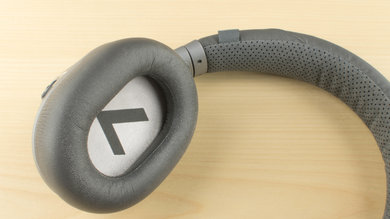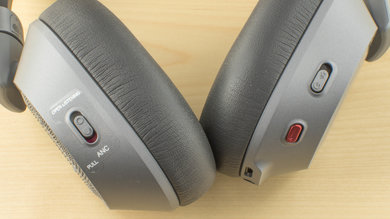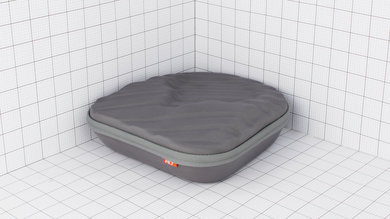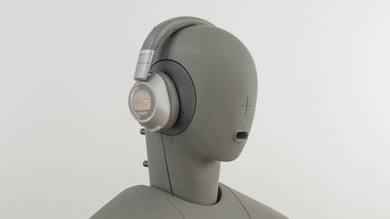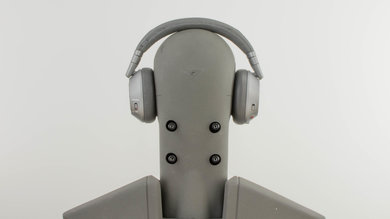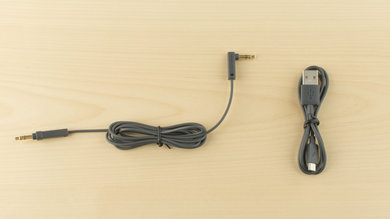The Plantronics BackBeat Pro 2 are good mixed usage wireless headphones and a much-improved design over the original BackBeat Pro. They're sturdy, comfortable headphones with an easy-to-use control scheme and an exciting sound quality. They're also packed with active features that make them suitable for most use cases, but unfortunately, they don't block as much ambient noise as some of the other noise-canceling headphones we've reviewed recently.
Our Verdict
Above-average for mixed-usage. The Plantronics BackBeat Pro 2 are versatile headphones for most use cases. They have a solid and durable design, an excellent wireless range and battery life and they sound balanced enough for most casual and even more critical listeners. However, they're a bit bulky for working out and only have an average isolation despite being noise canceling headphones.
-
Sturdy, durable build quality.
-
Good audio reproduction.
-
Excellent wireless range and battery life.
-
Noise isolation not as good as competing models.
-
Bulky design.
Good for neutral listening. They have a well-balanced mid and treble range and a powerful bass that should satisfy fans of bass-heavy music. However, the bass can sometimes overshadow some of the instruments and vocals depending on the track. They also have a small soundstage due to their closed-back noise canceling design.
Good for commuting. They're easy to use, comfortable and have a great battery life. Also, although the isolation is not the best, it should be sufficient for regular commuters, especially if you play your audio at moderate-to-high volumes.
Above-average for sports. They're a bit bulky and not the most breathable headphones to take to the gym. But they have a good wireless design so there's no audio cable to hinder you during your workouts and they're also tight enough on the head to be somewhat stable when running and jogging.
Great for office use. The Plantronics BackBeat Pro 2 don't leak much, they're comfortable and easy to pair with most Bluetooth devices. They're also packed with features that make them practical to use at the office such as smart pause, audio while charging and their excellent wireless range.
Below-average for gaming. They're comfortable and have a good bass-rich sound that suitable for gaming. Unfortunately, they will not work via Bluetooth with your consoles, and they are not as customizable as most gaming headsets. They also have a bit too much latency unless you use a dongle that supports aptX-LL. On the upside, they do have a simple audio cable that will provide audio with any device that has a headphone jack like your PS4 or Xbox One controller.
- 7.2 Mixed Usage
- 7.7 Neutral Sound
- 7.4 Commute/Travel
- 7.1 Sports/Fitness
- 7.4 Office
- 5.9 Wireless Gaming
- 7.5 Wired Gaming
- 6.7 Phone Calls
Changelog
- Updated Mar 02, 2020: Converted to Test Bench 1.4.
- Updated Nov 21, 2019: Converted to Test Bench 1.3.1.
- Updated Nov 21, 2019: Converted to Test Bench 1.3.
- Updated Feb 16, 2018: Converted to Test Bench 1.2.
- Updated Sep 28, 2017: The microphone has been tested with our new methodology, as explained here
Check Price
Compared To Other Headphones

The Plantronics BackBeat Pro 2 are a well-rounded wireless headset that is more versatile than the BackBeat Go 600. They're one of the best wireless over-ear headphones and the best closed-back headphones we've tested. They're comfortable, well-built headphones with an excellent wireless range and battery life. They have an exciting sound that packs a lot of bass without drowning instruments and vocals or sounding muddy and cluttered. They don't isolate as well as some of the more recent noise-canceling headphones but make up for it with a tough, durable build quality, a simple and efficient control scheme, and multiple codecs support that makes them suitable for watching movies and gaming. They're easily one of the most versatile over-ear headsets we've tested and one of the best headphones for music.
The Plantronics BackBeat Pro 2 Wireless 2016 are a better wireless over-ear than the Beats Studio3 Wireless. The Beats have a slightly better-balanced default sound than the Plantronics. They're also more comfortable and portable and have a sleeker design that's stable enough for the gym and sports. On the other hand, the Plantronics have a better wireless range and battery life than the Beats. They also have easier-to-use controls with more functionality, and they sound a bit more exciting thanks to their deep and powerful bass range.
The Bose QuietComfort 35 II/QC35 II Wireless 2018 are better noise canceling wireless headphones than the Plantronics BackBeat Pro 2 Wireless 2016. The Bose are lighter, more comfortable, and have a better-balanced sound profile than the Plantronics. They also have a much better noise canceling feature, which makes them more suitable for commute and travel than the Plantronics. On the other hand, the Plantronics have a better battery life, wireless range, and controls. They also have a more exciting sound that packs a deeper bass, which some may prefer over the Bose.
The Plantronics BackBeat Pro 2 Wireless 2016 are a better headset overall compared to the Bose QuietComfort 25/QC25 since they can be used wired and wireless. The Plantronics have a more versatile wireless design, so they have a greater range than the Bose and are a bit more practical for day-to-day casual use. The Plantronics also have a more exciting bass-heavy sound and a better battery performance than the Bose overall. The Bose, on the other hand, have a much better noise cancelation performance that makes them a better choice to use in loud, noisy environments. They also have a slightly better sound profile that's more balanced while still packing a fair bit of bass.
The Plantronics BackBeat Pro 2 Wireless 2016 are better headphones than the Anker SoundCore Space NC Wireless. Both headphones are suited for bass-heavy music, but the Plantronics have better overall audio quality. They also have a great 30-hour battery that only takes two hours to charge fully and can be connected to two devices simultaneously. The Plantronics also support aptX Lower Latency if your source can support it as well. However, their ANC isn’t the best, and the Anker are better in that category, making them a better option for commuting. The Anker also have a better microphone for calls, and their in-line one should be even better.
The Plantronics BackBeat Pro 2 are much better headphones overall when compared to the original Plantronics Backbeat Pro. The Pro 2 have a better design that's slightly more comfortable and has a sleeker look and feel. The Pro 2 also have better battery life, wireless range, noise cancellation performance, and sound quality. They pack a lot of bass but sound more balanced than the Pro. On the other hand, the original Backbeat Pro have a slightly better and more tactile control scheme. They also come with a better audio cable that has mic support for consoles and PC. The original Pro are also at a better value for your money than the Pro 2.
The Plantronics BackBeat Pro 2 Wireless 2016 are better wireless headphones than the Denon AHGC20 Wireless. The Plantronics have a better battery life, a longer wireless range, easier to use controls and a much better bass-heavy sound that does not drown vocals and instrumentals like the Denon. On the other hand, the Denon have a more premium build quality and a slightly more comfortable over-ear design that some may prefer over the Plantronics. The Denon also have much better noise cancelling performance, so they're a bit better suited for travel and noisy commutes.
The Plantronics BackBeat Pro 2 Wireless 2016 are a more feature-packed and a slightly better headset than the Bose SoundLink 2 Wireless since they're also noise cancelling. The Plantronics have a much better battery life and a much greater wireless range, which makes them suitable for pairing to fixed sources like a TV or a PC. They're also a bit more versatile since they support multiple codecs, and their ANC makes them a good option to use for your noisy commutes. On the other hand, the Bose have a more comfortable over-ear fit and a better-balanced sound that caters well to all genres and won't be as bass-heavy as the Plantronics.
The Plantronics BackBeat Pro 2 are a better wireless headset than the Sennheiser HD 4.50. The BackBeat Pro 2 have a sturdier and slightly more comfortable design, easier to use physical controls, a longer wireless range and battery life, and a better sounding default sound that packs a lot of bass. The Sennheiser, on the other hand, have a better noise cancellation feature, and since they are more compact, they're a bit better-suited for travel and commute. The HD 4.50 also leak less and have a more stable fit that you can use at the gym.
The Plantronics BackBeat Pro 2 Wireless 2016 are better-balanced and a much better noise cancelling headset than the Cowin E8 Wireless. The Plantronics have a better build quality, a longer battery life and a more exciting, bass-rich sound that's also better balanced with instruments and vocals than the Cowin. The Plantronics also have a much more intuitive control scheme, a better build quality, and support multiple codecs. On the other hand, the Cowin block a bit more noise with their ANC feature than the Plantronics.
The Plantronics BackBeat Pro 2 are better headphones than the JBL E65BTNC. They have better sound quality than the JBLs, leak less, and have an amazing 30-hour battery life. They also have a great control scheme and come with a nice solid case as well. The JBLs have an in-line microphone when the headphones are used wired, and they are more stable for physical activities. They also have better latency performance and a useful Bluetooth Sync button.
The Plantronics BackBeat Pro 2 and Plantronics BackBeat Go 810 are very similarly-designed headphones, but each performs better in different categories. The Pro 2 are more versatile since they have a better noise cancelling feature. They are also slightly more comfortable and feel like more high-end headphones due to their build quality. On the other hand, the Go 810 have great audio reproduction, without the overemphasized bass that the Pro 2 has. However, the Pro 2 can be used when charging and supports aptX-LL for minimal latency if you have the appropriate dongle.
The Plantronics BackBeat Pro 2 Wireless 2016 are better headphones than the Sony WH-XB900N. They both have a bump in low-bass, which is great for bass-heavy genres, but the rest of the Plantronics’ response is more neutral, which some users may prefer. The Plantronic's noise isolation performance is also slightly better, including in the bass range, making them a better option for commuting than the WH-XB900N. Both offer about over 30 hours of battery life, but the BackBeat Pro 2 take way less time to charge. They also support the aptX-LL codec for minimal delay. On the other hand, the Sony are more comfortable, and their app offers better customization options.
Video
Test Results
The Plantronics BackBeat Pro 2 kept some of the aesthetic of the previous Backbeat Pro but completely redesigned the ear cups and hinges to give them a more modern look. The ear cups are now oval and have additional hinges to give them more flexibility. The headband, however, remains the same, apart from the different padding material used in the build quality. Overall, it's a nice redesign but feels a bit bulky at times, especially, that the new hinges make the ear cups stick out, which may not be for everyone.
The Plantronics BackBeat Pro 2 redesign the ear cups of the previous model to a more oval shape that fits better around the ears. They're just as well padded and comfortable to wear for long sessions. Unfortunately, the ear cups are a bit shallow. They should be comfortable enough for most listeners and they're not too heavy for big over-ear headphones.
The Plantronics BackBeat Pro 2 keep the design etiquette of the BackBeat Pro by having well-determined and responsive buttons for each of the essential functions. The play/pause and skipping controls are all on the left ear cup and easy-to-use but not as intuitive as the turn dial on the previous model. A version of the volume dial is ported over to the BackBeat Pro 2, but it's not as tactile as the one on the first backbeat. On the upside, this control scheme is far more efficient than a lot of the high-end headphones we've reviewed that use touch-sensitive controls.
Like most closed-back over-ears, the Plantronics BackBeat Pro 2 are not very breathable headphones. The ear cups create a pretty good seal around your ears, and since they're closed-back headphones, they obstruct a good amount of airflow. This will make your ears sweat a bit more than average during long listening sessions. They won't be the ideal option for the gym.
These headphones have a bulky design that's not travel-friendly. They do not fold into a compact format to save space, but the earcups lay flat which may be useful in some situations. Unfortunately, this means the BackBeat Pro 2 are not portable and a bit of hassle to carry on your person without a bag.
Update: 06/04/2019 The hard case is only included in the special edition of the Plantronics Backbeat Pro 2, this means, as a user pointed out the regular and cheaper version of this model would have a slightly lower score for design overall.
The tough, hard case only comes with the special edition of the BackBeat Pro 2 (the regular model comes with a soft pouch). It's a sturdy case that will protect the headphones from scratches, drops and even mild water damage. Unfortunately, it's a pretty big case which takes up a lot of space making the already bulky headphones even harder to carry around without a bag.
The headphones have a sturdy and durable build quality. The ear cups are dense, and the headband is reinforced with a metal and plastic frame that's decently flexible but feels robust enough to withstand a couple of falls without getting damaged. However, the hinge mechanism is a bit different than in the previous model and adds more potential weak points to the build.
The frequency response consistency of the Plantronics BackBeat Pro 2 is very good. The lower regions of our over-ear and on-ear headphones are measured on 5 human subjects, 5 times each. In the bass range, there is little deviation across our human subjects, which could be due to the active noise cancelling system of the BackBeat. The deviation around 20Hz in the left ear cup will be noticeably but quiet subtle. In the treble range, there is about 4dB of deviation in response below 10Khz, which is not too bad.
The Plantronics BackBeat Pro 2 have an above-average bass. LFE (low-frequency extension) is at 10Hz, which is excellent. However, low-bass, responsible for the thump and rumble common to genres like EDM and Hip-hop, is overemphasized by about 7dB. This makes the bass of these headphones quite heavy and far from neutral, but without sounding too boomy, so fans of bass-heavy music may like it. Conversely, mid-bass and high-bass are underemphasized by 1.7dB and 3.8dB respectively, resulting in a bass that lacks a bit of punch and kick. If you'd like a more even and less thumpy bass, take a look at the similarly-performing Plantronics Backbeat Go 810, or the JBL CLUB 950NC Wireless. On the other hand, if you need even more bass then you might want to look at the Skullcandy Crusher Wireless that come with a dedicated bass slider for their haptic bass feature,
The mid-range is excellent. The response is very even and virtually flat. The wide shallow dip in low-mid thins out vocals a tiny bit, but it also creates more room the punch of the bass range. Also, mid-mid and high-mid are within 0.4dB of our neutral which results in a clear and well-balanced reproduction of vocals and lead instruments.
The treble performance is very good. Low-treble and mid-treble is quite flat and even. They are both within 0.2dB of our target which is great and results in a well-balanced reproduction of vocals and lead instruments. However, the 5dB bump around 10KHz could make the sound of these headphones slightly sharp, especially on cymbals.
The imaging is very good. Weighted group delay is at 0.43 which is within good limits. The GD graph however, shows that the group delay response crosses the audibility threshold around 40Hz, but not by much. This could make their bass a tad late and loose in certain areas, but overall, they will have a tight bass and a transparent reproduction. Also, our test unit was very well matched in amplitude and frequency response, which is important for the proper localization and placement of objects in the stereo image. However, we measured some phase mismatch in the treble range, which could weaken the stereo image a bit in the higher frequency region.
The Plantronics BackBeat Pro 2 has a below-average soundstage. The PRTF graph shows a decent amount of activation, which is decently accurate too. There is also a relatively deep 10KHz notch present. This results in a relatively natural and large soundstage. But because of the closed-back design, the soundstage of the headphones may be perceived to be less open than that of open-back headphones.
The noise isolation of the BackBeat Pro 2 is decent but not as good as competing models like the Sennheiser HD 4.50 BTNC or the cheaper Anker SoundCore Space NC. In the bass range, where the rumble of airplane and bus engines sit, they achieve 7dB of isolation, which is about average. In the mid-range, important for blocking out speech, they achieve 14dB of isolation, which is above-average. In the treble range, occupied by sharp sounds like S and Ts, they isolate by more than 36dB which is very good. If you want over-ear headphones with much better ANC, check out the Razer Opus Wireless.
The Plantronics BackBeat Pro 2 have a good leakage performance. The significant portion of the leakage is between 500Hz and 8KHz, which is relatively broad. However, the overall level of the leakage is quite low. With the music 100dB SPL, the leakage at 1 foot away, averages at about 35dB and peaks at 47dB SPL which is just below the noise floor of an average office.
The recording quality of the microphone is sub-par. The LFE (low-frequency extension) of 530Hz means speech recorded/transmitted with this mic will sound noticeably thin. The HFE (high-frequency extension) is at 3.6KHz resulting in a speech that lacks detail and sounds a bit muffled. The bump between 1.5KHz and 3.5KHz could make speech on this microphone a bit too sharp sounding.
The integrated microphone of the Plantronics BackBeat Pro 2 is decent at noise handling. In our SpNR test, they achieved a speech-to-noise ratio of 19dB. This means they are best suited for quiet environments, and they will also be able to handle moderately loud environments decently. However, they will struggle to separate speech from ambient noise in loud places.
The Plantronics BackBeat Pro 2 have an excellent battery life. They take about 2 hours to charge fully but deliver up to 30 hours of continuous playback at moderate volumes. They also have a bunch of power saving features like; smart pause, audio while charging, auto off and complete passive playback when the battery finally runs out. This makes them good travel headphones, especially if you do not have frequent access to a power source.
Update 05/08/2020: After user feedback, we've updated the test results to mention that the Plantronics Hub app is also available on macOS and Windows. The scoring of the app didn't change.
The Plantronics Hub is a unique app that doesn't enhance your listening experience but provides some tools that may be useful to some. They provide a last position synced tracker and a find my headphone feature that makes them easy to find if ever you misplace them. However, due to the size of the BackBeat Pro 2, it's not always the most practical tool. On the upside, it also displays the battery information as a notification, so you can monitor how much battery you have left at all times.
Update 06/04/2019: Only the special edition of the Plantronics Backbeat Pro 2 has NFC, this means, as a user pointed out the regular and cheaper version of this model would have a lower score for Bluetooth and connectivity overall.
The Plantronics BackBeat Pro 2 have multi-device pairing and support NFC which makes pairing with smartphones a bit easier. They have different values of latency depending on which codec you're using. With SBC or aptX they will have a bit too much latency to watch movies without any delay in audio, but with aptX-LL, they should be suitable for video content and even gaming. However, you will have to get a Bluetooth dongle that supports aptX-LL to take advantage of the low latency performance.
These headphones come with a simple audio cable with no in-line remote or USB adapter. This means they do not have a mic that is compatible with consoles. On the upside, they will provide audio with any device that has a headphone jack.
The Plantronics BackBeat Pro 2 do not have a base/dock. If you want a versatile headset with a base that you can also use wired, check out the Arctis 7 by SteelSeries.
Comments
Plantronics BackBeat Pro 2 Wireless 2016: Main Discussion
Let us know why you want us to review the product here, or encourage others to vote for this product.



